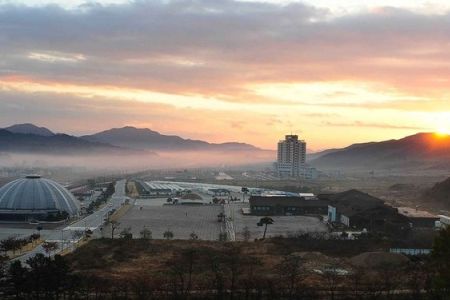North Korea has proposed official talks with South Korea on normalizing commercial projects, weeks after operations at the joint Kaesong industrial zone were suspended.
In a statement from state news agency KCNA, North Korea said the place and date could be “set by the South side”.
Kaesong Industrial Complex, just inside North Korea, is a key source of revenue for Pyongyang.
But it pulled out its workers in April amid high tensions on the peninsula following its February 12 nuclear test.
Since then operations at the zone, where more than 100 South Korean manufacturers employ some 53,000 North Korea workers, have been halted for the first time since the project began a decade ago.
North Korea said late last month it would invite South Korean businessmen back to discuss the resumption of operations but Seoul ruled that out, saying working-level government talks should be held.
There was no immediate response from South Korea.

The KCNA statement, attributed to the Committee for the Peaceful Reunification of Korea, said that hotlines cut during the period of high tension would be reconnected if South Korea agreed to the talks.
“We propose holding talks between authorities of the North and the South for the normalization of the operation in the KIZ [Kaesong Industrial Zone] and the resumption of tour of Mt Kumgang,” it said.
The Mount Kumgang resort is a joint tourism project that has been suspended since a South Korean tourist was shot dead there by a North Korean guard in 2008. North Korea has since seized assets of the resort’s South Korean operator.
Restarting reunions of separated families could also be discussed, the North Korea statement said, adding: “The venue of the talks and the date for their opening can be set to the convenience of the South side.”
While South Korea may want to discuss Kaesong, its government has made it clear in the past that more wide-ranging dialogue should be linked to progress on denuclearization.
The offer comes after several months of threats and rhetoric from the communist North Korea.
Apparently angered by the US sanctions imposed after its third nuclear test and annual South Korea-US military drills, it warned of attacks on regional targets and cut key economic and communications links with Seoul.
In recent weeks, however, tensions appear to have lessened somewhat. Late last month, North Korea sent an envoy to Beijing – seen as having the greatest degree of influence on Pyongyang – for talks, for the first time since its nuclear test.


